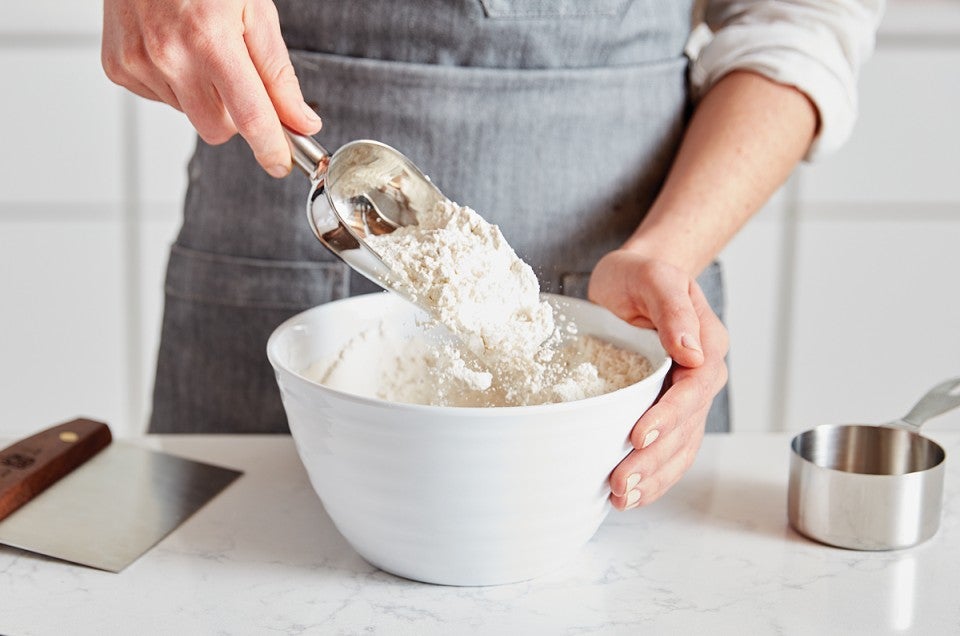Bleached vs. unbleached flour: What's the difference?
How to understand your flour’s label.


White flour is white flour — but not all white flour is created equal. Differences in milling, as well as how the flour is treated after it’s milled, can have big impacts on flour. And one of the primary ways flour is treated is through bleaching. Refined wheat flours (i.e., not whole wheat), such as all-purpose flour, cake flour, and self-rising flour, are either bleached or unbleached during production. But what exactly does that mean?
In brief: Unbleached flour is naturally aged after milling, during which time it slowly oxidizes and whitens. Bleached flour, on the other hand, uses chemical treatments to manually speed up this process. Both can be used interchangeably in baking; so why should you choose one over the other?
Let’s break it down a little more.

During the 1940s (the heyday of Wonder Bread, the first sliced bread on the market), white flour became a popular fixture in commercial bread. And while Wonder Bread is no longer the only, nor the most popular, bread on the market, contemporary millers are still primarily in the business of making white flour. The first step in accomplishing this is to separate the bran and germ of the wheat berry through the milling process itself. That’s what distinguishes whole wheat flour, which is made from the entire wheat kernel, from white flour, which is only the milled endosperm.
The next step in this process is to “whiten” the remaining flour. Given time and exposure to air, flour will slowly oxidize and whiten on its own. This rest period, around two weeks in the summer and up to a month in the winter, also changes flour’s chemistry so that it will create a dough that is more elastic. This is unbleached flour, and it’s how King Arthur Baking Company makes all of our refined flours.
But rather than using time as an agent, as we do, many millers use chemicals to whiten flour almost instantly. As the flour comes off the line at the mill, bleaching and oxidizing chemicals are added in order to quicken or entirely replace the aging process. This is how bleached flour is made.

The chemicals used to whiten and/or oxidize flour include chlorine dioxide, benzoyl peroxide, and chlorine gas, all of which are currently permissible additives (though King Arthur Baking Company flours do not contain any of them). Benzoyl peroxide leaves behind some benzoic acid; some people with an acute sense of taste recognize benzoyl peroxide in baked goods because it has a bitter aftertaste, but its addition does not appreciably change its baking qualities.
Chlorine gas reacts with the flour to change its absorbency, flavor, pH, and, in the case of some cake flours, its performance. In baked goods where other ingredients do not mask it, it imparts a detectable flavor to people with sensitive palates.
The most controversial additive used today is potassium bromate, which is still in use both as an oxidizer and an “improver,” strengthening dough and allowing for greater oven spring and higher rising in the oven. It has come under scrutiny, however, as tests with it have indicated that it is carcinogenic in animals and probably in humans. Since 1991, flour sold in California containing potassium bromate has had to carry a warning label, and it was recently banned in the state as well. It is also banned in Canada, Europe, and Japan, and will likely someday be banned in other parts of the United States. (This is why King Arthur bags proclaim that our flour is “Never Bromated.”)
Ultimately, the flour you choose to bake with is entirely up to you. Bleached and unbleached flours can both be used interchangeably in any recipe without a major discernable difference. But understanding what sets them apart can help you make your decision.
And if that decision is to bake with unbleached flour? You know we’ve got you covered.

